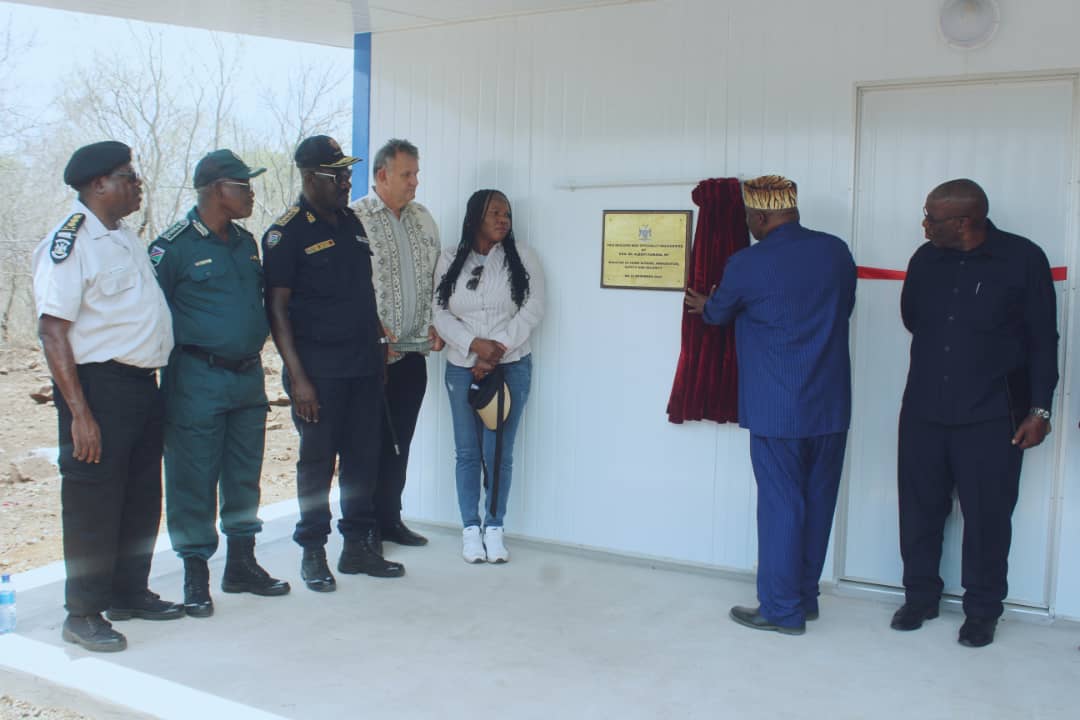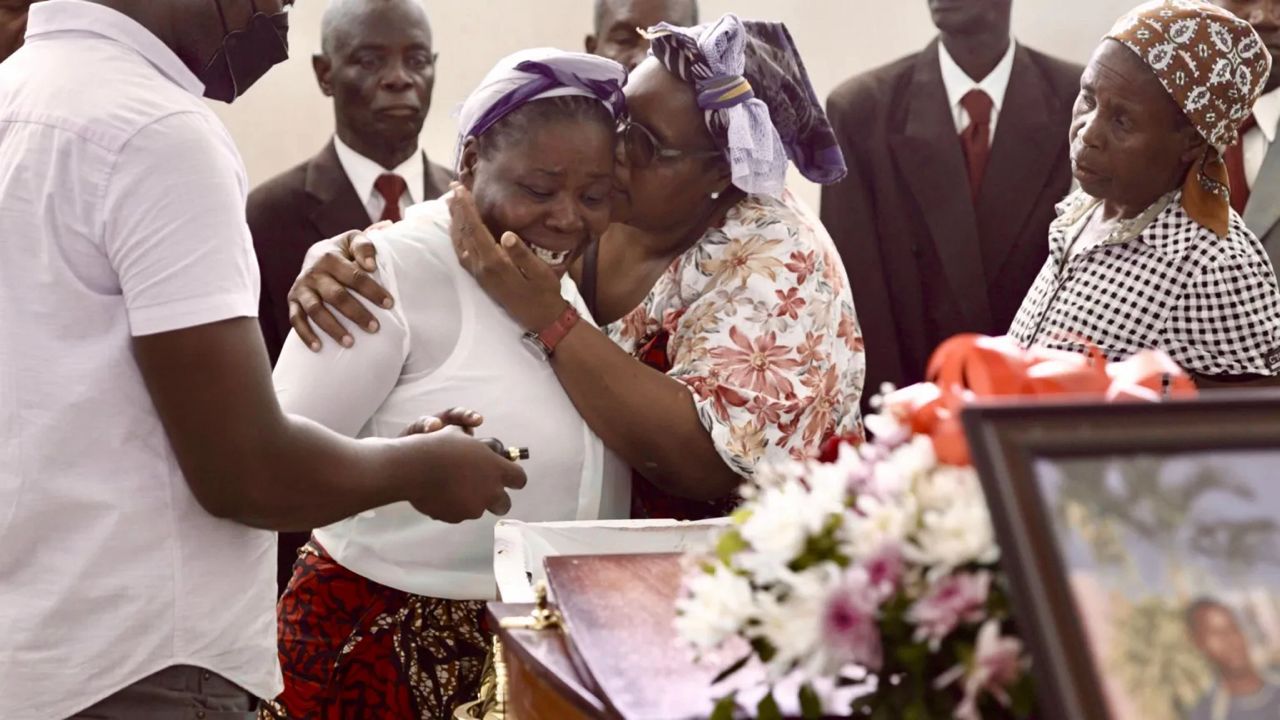In Namibia’s townships, amid harsh realities, an unexpected heroine roams the streets – Donna Collins, a veteran journalist-turned-animal advocate.
Collins has traded her notepad for dog food, blankets and medicine.
She drives through the streets of Swakopmund’s Mondesa and DRC townships in search of suffering animals.
For the last four years, she has been on a mission to rescue neglected, abused, and abandoned dogs.
Armed with a Suzuki Jimny packed to the brim with supplies and a heart full of compassion, Collins has become a lifeline for these forgotten animals through her Township Doghouse Project.
During the Covid-19 lockdown, while most people were confined to their homes, Collins was given permission by the police to distribute dog food.
“You realised then how the lack of food affected not just people, but their pets too. It became more difficult for people to feed their dogs,” she says.
HOW IT BEGAN
The journey began with Big Mama, a pit bull terrier Collins found locked in a cage at Mondesa.
Big Mama was used solely for breeding, neglected by her owners, left malnourished, covered in sores, and emotionally broken.
“She was just skin and bones when I found her,” Collins says.
“But despite everything, there was a spark in her eyes that told me she hadn’t given up. I knew I couldn’t give up on her.”
Collins rescued Big Mama, nursed her back to health, and gave her a second chance at life.

Today, Big Mama serves as Donna’s ‘poster girl’.
“Her recovery gave me the strength to keep going. If I could save one dog, why not save more?” she asks.
Collins continues to feed, rescue and help many pit bull terriers, as their plight is particularly dire.
“Many are chained and used for breeding, because they fetch higher prices,” she says.
4 X 4 FULL OF COMPASSION
Collins drives her small 4×4 – its back packed with dog food, water, blankets, medicines, flea and tick treatments, and old collars – through the winding, narrow streets of the townships.
“These dogs need shelter, medical care and love. Many have been through hell and I’m here to show them that there are still people who care.”
Collins’ supplies come from donations as well as her own funds.
“I’m fortunate to have people who donate food and blankets,” she says.
“These animals deserve a fighting chance.”
Her journey through these townships is not without challenges. The roads are often rough. Dogs are chained in the sun without shelter, left without food or water, or abandoned to roam the streets.
“I can’t save them all, but I can save some.”
THE TOWNSHIP DOGHOUSE PROJECT
Through the Township Doghouse Project, Collins and her small team of volunteers build homes for the dogs most in need.
“A doghouse may not seem like much,” she says, “but for a dog left outside, exposed to the elements, it can mean the difference between life and death.”
Donna is often joined by Nigel Megenis, who runs a local handyman business, and Zimbabwean Nyasha Taruvinga, who builds the doghouses.
Megenis transports them using his bakkie.
“They’ve built hundreds of houses over the years, and they even come with me to deliver them,” Collins says.
Menegis says: “We’re not just delivering and building homes; we’re giving these dogs a chance at a better life.”

Taruvinga is also happy to help the animals.
“We’re giving them some dignity. That’s what matters most, and I’m glad to be part of this,” he says.
The joy on the dogs’ faces as they explore their new homes is a reward that keeps the team going.
“It’s hard work, but seeing the change in these animals makes it all worth it,” Collins says.
COLLABORATIVE EFFORT
Although Collins spearheads the Township Doghouse Project, she is far from alone in her efforts.
In addition to Megenis and Taruvinga’s support, she works closely with organisations like the Swakopmund Society for the Prevention of Cruelty to Animals (SPCA), local vets and the Have a Heart Foundation.
“The SPCA has been amazing,” Collins says. “When I find a dog that’s too injured or sick for me to care for, I bring them to the SPCA, where they can get the treatment they need.”
Swakopmund SPCA manager Ingrid Gürtel praises Collins’ work.
“Donna has done so much for the dogs in these townships,” she says.
“She brings us dogs that need rehabilitation and, once they’re healthy, we help her resettle them, mostly with their owners who are then better informed.”
Sterilisation is a key component of Collins’ work.
Through the Have a Heart Foundation, she ensures that as many dogs as possible are sterilised, vaccinated, and treated for common diseases.
“The overpopulation of dogs in these townships is a huge problem,” says Have a Heart representative Sheelagh Bagot-Smith.
“By sterilising the dogs, we can help control the population and prevent further suffering.”
One of the remarkable aspects of Collins’ work is the transformation she sees in the dogs she rescues.
“It’s amazing to see how quickly they change. Tthey become like puppies again – full of love and energy.”
One such dog is Jacky, owned by Bernhard Ekonias.
Before Collins stepped in, Jacky was thin, malnourished and sickly.
“Donna gave us a new doghouse for Jacky and helped us with food,” Bernhard says.
“Now, Jacky is happy and healthy. We are very grateful for what she’s done.”
Another success story is that of Sasha, a dog that survived a shack fire in Mondesa several years ago.
Her owner, Marcelien Tjazuko, is grateful to Collins for helping nurse Sasha back to health.
“Sasha is a different dog now,” Marcelien says.
“She used to be scared of everything, but now she guards our house and even drinks coffee with us in the mornings!”
These stories are what keep Collins going, even on the toughest days.
“It’s not always easy,” she admits. “Sometimes the dogs are too far gone, and we have to put them down.”
DOG THEFT AND OVERPOPULATION
Despite Collins’ progress, the challenges are immense. One of the most shocking realities she has uncovered is the theft of healthy dogs for meat.
“There’s a real problem with dog theft in these townships,” she says.
“People steal healthy dogs and sell them for kapana. It’s heartbreaking.”
Overpopulation remains a pressing issue. In the townships, dogs breed uncontrollably, leading to more unwanted puppies.
“There’s no law here that says you have to sterilise your dog,” Collins notes.
“People don’t always mean to neglect their animals, but they can’t afford to take care of them properly, and the cycle continues.”
RELENTLESS COMMITMENT
Collins’ work is physically and emotionally demanding, with her often returning home covered in dust and scratches.
“It’s all part of the job,” she says. “Sometimes I get bitten, but that’s just how it goes. These dogs have been through so much, and they’re scared. But once they know you’re there to help, they come around.”
Despite the challenges, Donna’s commitment remains unwavering.
“This is my calling,” she says.
Stay informed with The Namibian – your source for credible journalism. Get in-depth reporting and opinions for
only N$85 a month. Invest in journalism, invest in democracy –
Subscribe Now!






